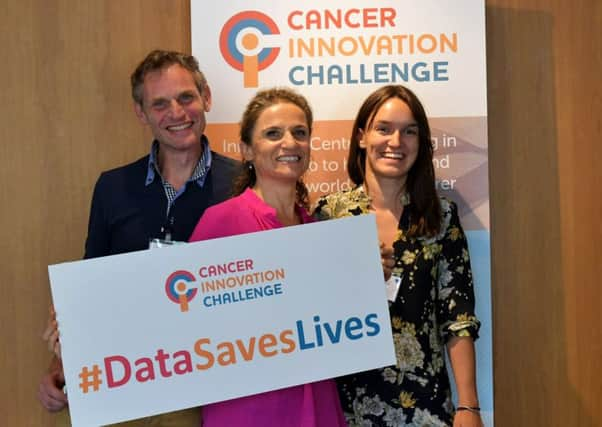Tech firms working to extend cancer survival rates by up to five months


Two projects which offer improved treatment options this week received a £100,000 award to progress to the second phase of the prestigious Cancer Innovation Challenge.
Both technologies are used to record patient reported outcome measures (PROMs) and patient reported experience measures (PREMs) and integrate them with existing NHS systems.
Advertisement
Hide AdAdvertisement
Hide AdAllowing cancer patients to record symptoms such as pain, nausea or tiredness as they experience them gives doctors a more accurate understanding of their condition and how they are responding to treatment.
The tools will enhance cancer patients’ experiences during treatment, potentially improve their life expectancy and also deliver longer-term insights into the effectiveness of different treatments for clinicians.
The Cancer Innovation Challenge aims to inspire novel data and tech innovations to help Scotland become a world leader in cancer care. It is funded by the Scottish Funding Council and delivered by three Scottish innovation centres, led by The Data Lab in Edinburgh.
Dr Catherine Calderwood, Scotland’s chief medical officer, said: “Ensuring that the person receiving care is at the centre of medical decision making is crucial. Getting accurate information from patients about their symptoms at the time they are experiencing them is core to this. This is particularly pertinent for people with cancer. How they feel really matters.
“Patient-reported outcomes (PROs), using innovative tools such as these, will enable doctors to weigh-up risks and benefits of individuals’ treatments. It takes the pressure off the patient having to remember how they felt a week or two ago when they are coming in for their next appointment. Using such tools has the potential to enhance the quality of life for patients while they are going through treatment. Ultimately it is about improving services, treatments and outcomes for people with cancer.”
The first project to win funding, OWise, is an app developed by Px HealthCare specifically for breast cancer patients. It will include a specific notification, which nudges patients to contact the Cancer Treatment Helpline in reaction to certain symptoms in a bid to address Scots’ reticence to ‘be a bother’.
Crucially, the OWise tool, which provides clinicians with a real time view of patient reported outcomes, will be able to be integrated with TrakCare – a patient management system widely used throughout NHS Scotland.
The second project, Clinical Outcomes, is a web-platform used to collect and analyse variation in patient-reported outcomes. The platform has been tailored for patients in Scotland with any cancer type, and will be piloted with haematological cancer patients at NHS Ayrshire and Arran. Patients answer regular assessments and track the impact of their condition on their life through a personal dashboard. Clinicians can immediately access this valuable new information about the effectiveness of treatment to inform ongoing clinical decisions.
Advertisement
Hide AdAdvertisement
Hide AdIt has been designed to include guidance from Macmillan Cancer Support and is interoperable with Orion Healthcare, another well-established clinical portal in Scotland.
Both now have six months to further develop their prototypes and further demonstrate their benefits and roll-out potential.
Professor Andy Mount, dean of research at the University of Edinburgh’s college of science and engineering, said: “We congratulate those successful companies in phase two of the competition and look forward to the development of their technologies, to address the opportunity of harnessing data to drive innovation in cancer treatment in Scotland.”
